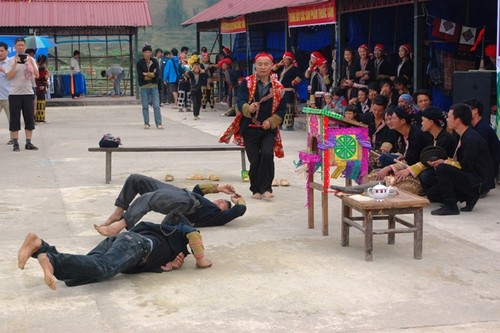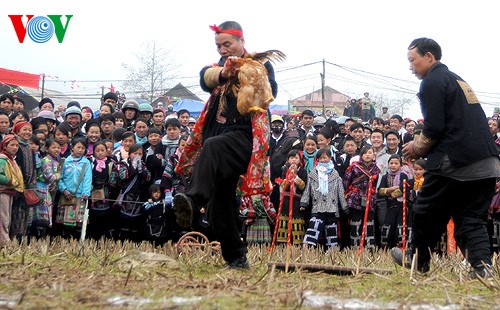(VOVworld) – The dance festival (Tzay panh) of the red Dao in Yen Bai province is one of the most interesting ethnic festivals in Vietnam’s northern mountain region.

A performance of the Dao's dancing festival at the Sa Pa Culture and Tourism week 2014. |
The dance festival is an important religious and cultural ritual of the Dao ethnic group. Traditionally, the ritual is organized by the heads of the major Dao clans: Lý, Bàn, and Triệu. The ritual begins at 7 p.m on the 1st and 2nd day of the 1st lunar month to pray for good luck in the new year. Triệu Quý Hồi of Văn Chấn district said: “The dance festival of the Dao prays for favorable weather, bumper crops, happy families, and prosperity. It’s an event that teaches young people to preserve their unique cultural values. It also teaches people to do good deeds in life.”
The main ritual consists of dances performed by young men and women under a sorcerer’s direction to the rhythm of gongs.
The sorcerer directs a commencing dance called leading the way and making a bridge to welcome the ancestors and gods to celebrate Tet. In the dance to greet the deceased ancestors, the dancers hop on one foot, lower their heads, and raise high their index fingers.
To welcome the fairies to earth, the dancers imitate storks spreading their wings to fly and finding places to perch. The dance to invite the gods is characterized by the deliberate and powerful steps of a tiger. The dances, highly symbolic, paint a scene in which souls, gods, and fairies come to enjoy Tet. Bàn Phúc Châu is a famous sorcerer in Bó Mi 1 hamlet, Tân Phượng commune. “The Dao people think adult men and women are accompanied by and protected by civil mandarins and military mandarins. The dances symbolically assemble deceased ancestor guardians and invite them home so the ancestors will have sufficient power to support the living descendants.”
 |
| "Offering a rooster" is part of the dance festival |
During the festival, people sing songs in praise of their ancestors’ merits, stories of their clans, and the customs of planting, hunting, and weaving. The dance festival is organized by a clan but it attracts a large number of spectators from inside and outside the hamlet, who cheer the dancers, especially the brave young men who can jump very high and roll over a fire without being injured. 71-year-old Bàn Phúc Sương has a profound knowledge of the Dao.
“The dance festival, Tzay panh, should be held every 3 to 4 years. If they don’t organize it, they will feel that the ancestors’ protection is starting to dissolve. The dead will no longer be able to protect the living against natural disasters. The family will suffer business losses and become sick. The festival has been upheld by many generations.”
An important part of the festival is the worshipping ritual, when they review the family’s roots, traditions, production, and achievements. The ritual ends with a dance involving both the sorcerer and the young Dao men.